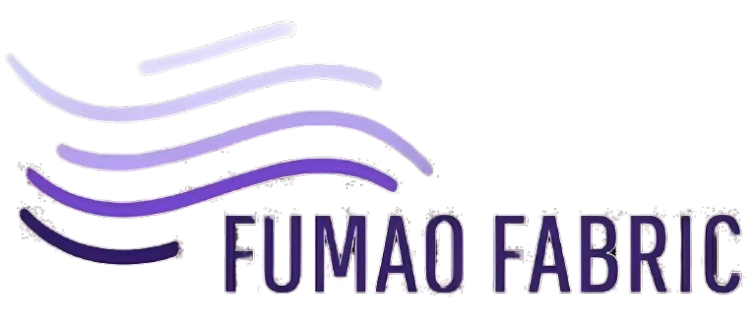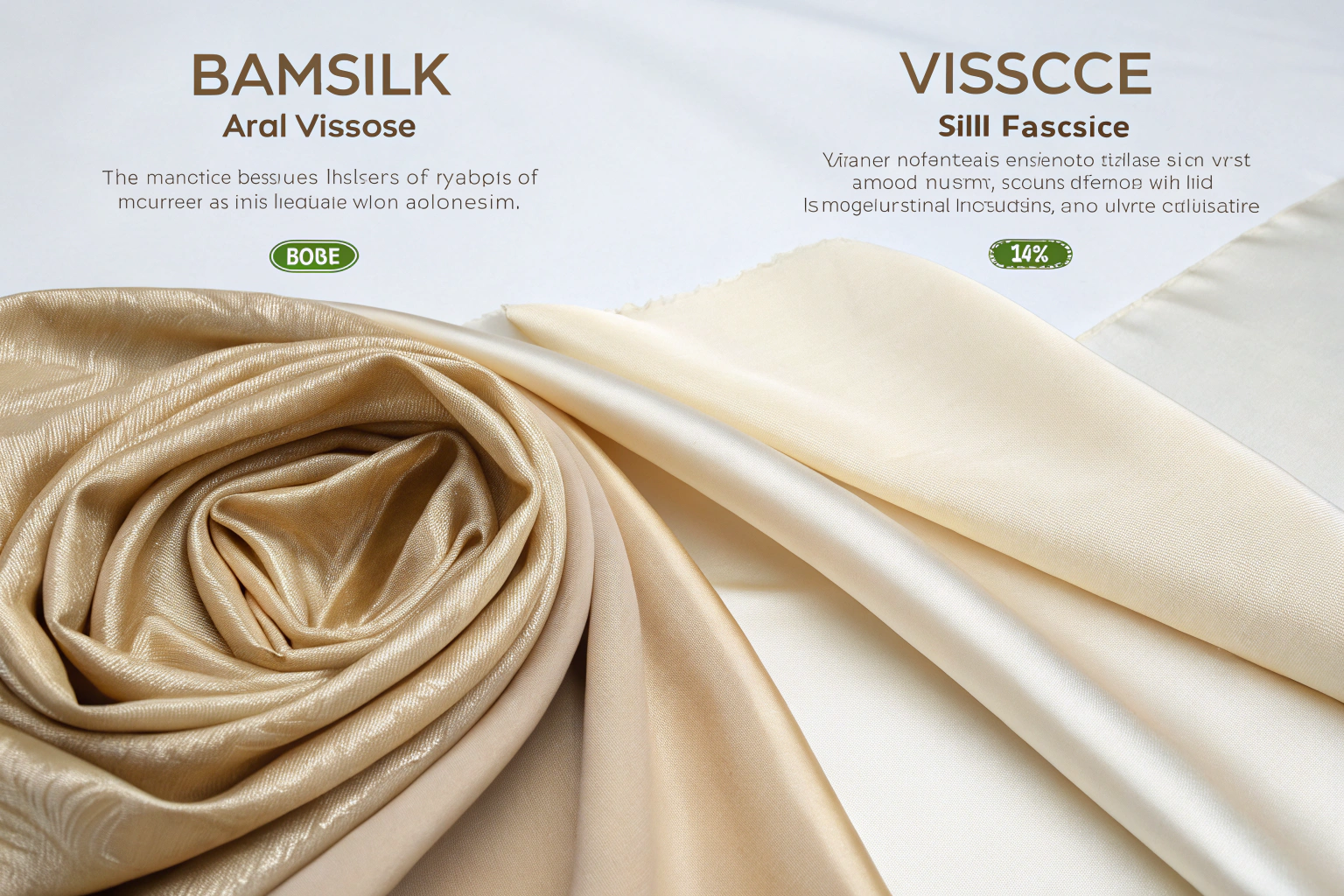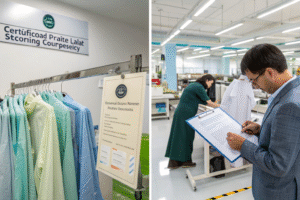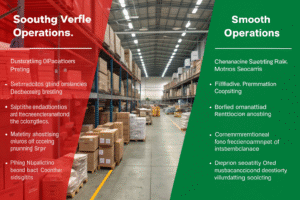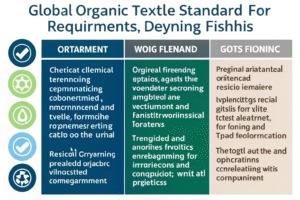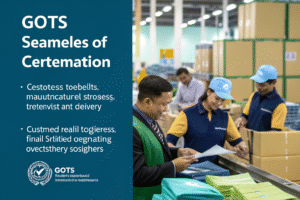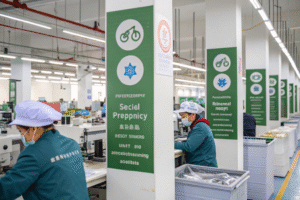As a fabric supplier with over two decades in China's textile industry, I frequently encounter questions about innovative materials. BAMSILK bamboo fabric has emerged as a popular choice among our American and European clients, particularly those seeking sustainable alternatives to traditional viscose. Understanding the distinction between these fabrics is crucial for making informed decisions that align with your brand's quality standards and environmental values.
BAMSILK represents a premium grade of bamboo fabric characterized by its silk-like texture and enhanced durability, while viscose encompasses a broader category of regenerated cellulose fibers. The fundamental differentiator lies in their manufacturing processes and performance characteristics, with BAMSILK typically utilizing a more environmentally conscious closed-loop system that positions it as a superior option for eco-conscious fashion brands.
The Sustainable Foundation of BAMSILK Fabric
BAMSILK originates from Moso bamboo (Phyllostachys edulis), a remarkably sustainable plant that thrives without pesticides and requires minimal water. The transformation from robust bamboo stalks to luxurious fabric involves sophisticated manufacturing techniques that distinguish BAMSILK from conventional bamboo viscose alternatives.
The production begins with bamboo pulp derived from crushed bamboo plants. Through a closed-loop manufacturing system, solvents and water are continuously recycled throughout the process, significantly reducing environmental impact. This method yields a regenerated cellulose fiber that combines exceptional softness with natural biodegradability, making BAMSILK an increasingly popular choice for brands prioritizing eco-friendly textiles.
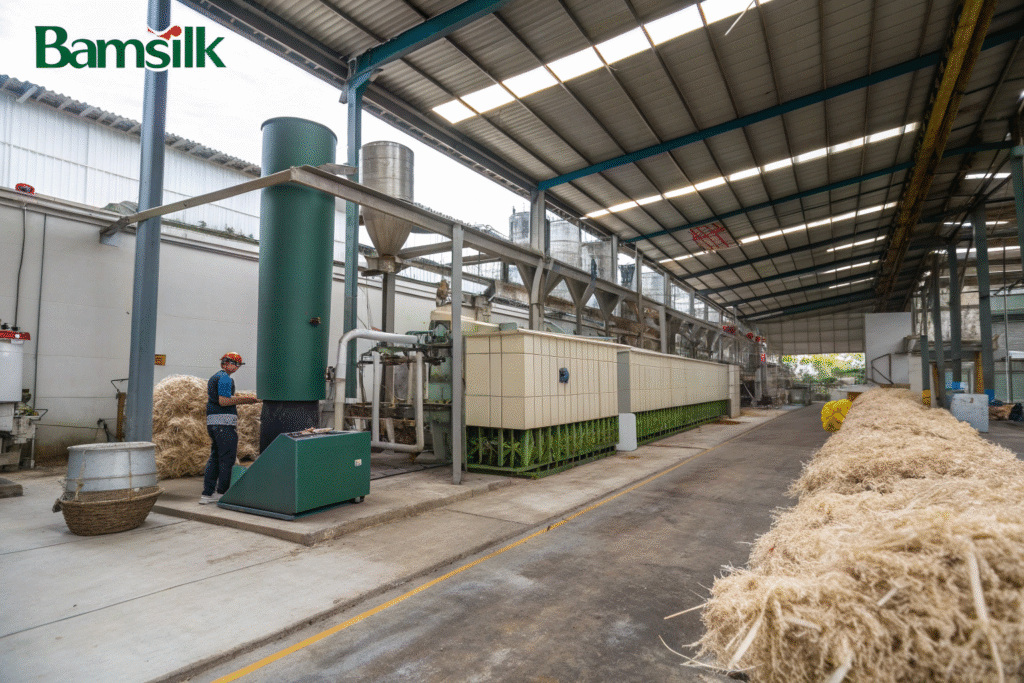
How Does BAMSILK Production Ensure Environmental Responsibility?
BAMSILK's environmental credentials are rooted in its advanced manufacturing methodology. Unlike conventional viscose production that often involves carbon disulfide, our BAMSILK manufacturing employs a hydrolysis-alkalization technique similar to that used for Tencel™ lyocell. The closed-loop system captures and reuses over 99% of the processing solution, dramatically minimizing ecological impact while aligning with our company's substantial investment in sustainable production practices.
The bamboo sourcing comes exclusively from certified forests practicing sustainable management, ensuring continuous supply without environmental degradation. Our quality control teams monitor the entire process to maintain strict environmental standards, resulting in not only an eco-friendly product but also a superior quality fiber that benefits both planetary health and product excellence.
What Unique Characteristics Define BAMSILK Fabric?
BAMSILK fabric demonstrates exceptional properties that make it stand out in the textile marketplace. Its most notable attribute is the extraordinary softness that rivals premium cashmere and silk, providing a luxurious tactile experience that appeals to high-end markets. The fabric's structure enables superior breathability and moisture-wicking capabilities, absorbing and evaporating moisture more efficiently than traditional cotton.
The fabric's natural thermoregulation stems from microscopic gaps within the bamboo fibers that facilitate optimal air circulation, maintaining comfort across varying temperatures. Additionally, BAMSILK contains natural "bamboo kun" bio-agents that provide inherent hypoallergenic and antibacterial properties, making it particularly suitable for sensitive skin applications and functional apparel like activewear and children's clothing.
Key Differences: BAMSILK vs. Traditional Viscose
While both BAMSILK and traditional viscose originate from plant-based cellulose, their environmental impact and structural integrity differ substantially. The primary distinction lies in manufacturing chemistry—traditional viscose processing typically involves carbon disulfide, whereas BAMSILK production utilizes non-toxic solvents within a closed-loop system that recycles water and chemicals, significantly reducing ecological footprint.
From a performance perspective, BAMSILK demonstrates superior strength and durability compared to standard viscose, maintaining structural integrity through multiple wash cycles. Both fabrics offer softness, but BAMSILK achieves a more luxurious, silk-like hand feel while providing enhanced color absorption for more vibrant, long-lasting dye results that benefit brand identity and customer satisfaction.
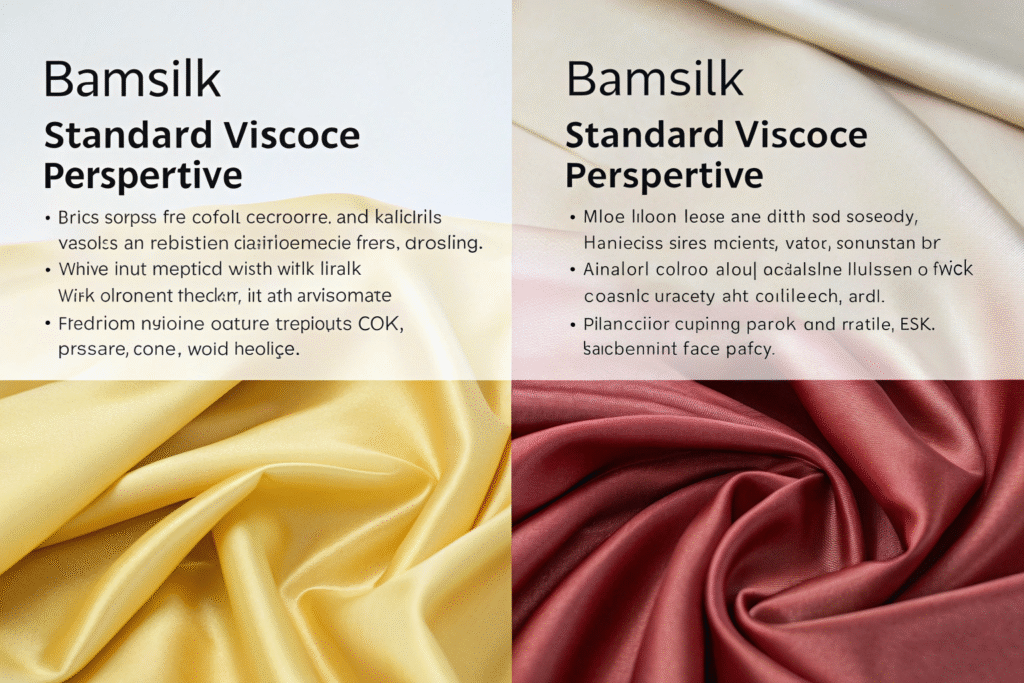
Which Fabric Offers Superior Environmental Credentials?
BAMSILK clearly leads in environmental performance due to its advanced closed-loop production system that captures and reuses solvents and water, preventing environmental contamination. This manufacturing approach has gained international recognition for its minimal ecological impact, contrasting with traditional viscose production that often releases chemicals like carbon disulfide into the atmosphere and waterways.
| Environmental Factor | BAMSILK Bamboo Fabric | Traditional Viscose |
|---|---|---|
| Production System | Advanced Closed-Loop | Typically Open System |
| Chemical Management | Non-Toxic Solvents (Recycled) | Carbon Disulfide (Potential Emissions) |
| Water Conservation | Significantly Reduced & Recycled | Generally Higher Consumption |
| Biodegradability | Fully Biodegradable | Biodegradable |
The sustainable credentials extend to the bamboo plant itself, which grows rapidly without fertilizers while improving soil quality. Choosing BAMSILK supports supply chain responsibility and aligns with international environmental regulations including EU eco-certification standards for textiles.
How Do Durability and Care Requirements Compare?
Durability represents a crucial consideration for manufacturers and consumers alike. BAMSILK fibers generally demonstrate greater strength than traditional viscose due to more controlled manufacturing processes, maintaining shape and integrity through extended use with reduced pilling and thinning. Traditional viscose typically weakens when wet, requiring more delicate handling during care and maintenance.
Both fabrics benefit from gentle washing methods, though BAMSILK's inherent strength provides additional margin for error. Recommended care includes cold water washing with mild detergents, air drying or low-heat tumble drying, and low-temperature ironing. The robust nature of BAMSILK makes it suitable for diverse applications including daily wear, activewear, and premium home textiles, ultimately extending garment lifespan and reducing replacement frequency.
Advantages of BAMSILK in Clothing Manufacturing
BAMSILK offers numerous advantages that directly address contemporary brand requirements and consumer preferences. The most immediately noticeable benefit is the exceptional comfort derived from the fabric's soft, smooth texture that gently interacts with skin, reducing irritation and making it ideal for sensitive skin or conditions like eczema. The moisture-wicking properties efficiently manage perspiration, keeping wearers dry and comfortable—particularly valuable in sportswear and undergarments.
From a commercial perspective, BAMSILK provides a compelling sustainability narrative that resonates with environmentally conscious consumers. Incorporating BAMSILK into product lines enables brands to access the growing market for eco-friendly products while enhancing brand image and supporting corporate social responsibility objectives. The natural antibacterial properties mean garments maintain freshness longer, reducing washing frequency and providing additional environmental benefits to communicate to customers.
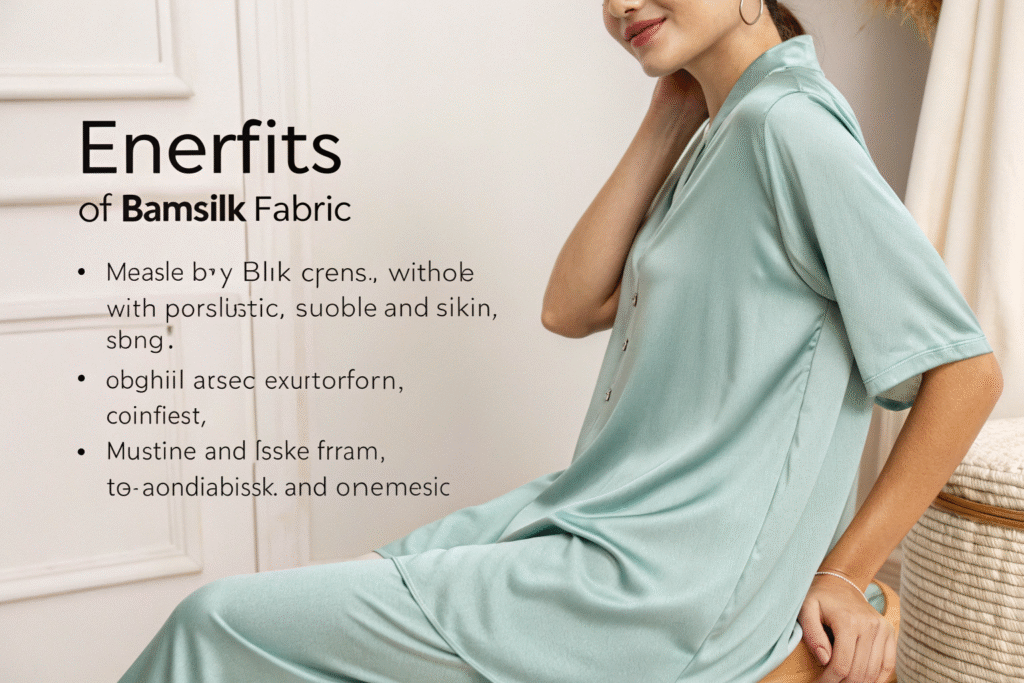
Why is BAMSILK Ideal for Sensitive Skin and Activewear?
BAMSILK's biological properties make it exceptionally suitable for sensitive skin and activewear applications. The naturally occurring "bamboo kun" within the fiber acts as an antibacterial agent that inhibits odor-causing bacteria growth, keeping athletic wear and everyday garments fresher for extended periods. For sensitive skin, this bacterial reduction minimizes irritation risks, while the fiber's smooth, chemical-free structure eliminates the itching associated with some synthetic fabrics.
The fabric's breathability and natural thermoregulation provide additional benefits during physical activity. BAMSILK's unique micro-gaps enhance ventilation, effectively dissipating heat and moisture to maintain a comfortable microclimate against the skin. These characteristics position BAMSILK as a superior choice for athleisure wear that performs during exercise while maintaining comfort throughout daily activities.
How Can BAMSILK Enhance Brand Market Positioning?
Integrating BAMSILK into product collections can significantly strengthen brand positioning in the marketplace. Contemporary consumers increasingly prioritize sustainability and actively seek brands demonstrating environmental responsibility. By utilizing BAMSILK, brands can promote not just products but sustainable lifestyles, leveraging the compelling narrative of eco-friendly production from sustainable sources to differentiate from competitors.
The luxurious texture and high-performance characteristics enable premium product positioning that resonates with consumers valuing quality, comfort, and conscience. This alignment with consumer values supports price points reflecting product excellence while demonstrating commitment to global initiatives like the UN Sustainable Development Goals, positioning brands as forward-thinking industry leaders.
Reliable Sourcing Strategies for Quality BAMSILK
Sourcing high-quality BAMSILK fabric requires partners with demonstrated expertise and transparent supply chains. The initial step involves verifying supplier certifications that confirm fabric composition and environmental claims. Certifications like Oeko-Tex Standard 100, which tests for harmful substances, provide crucial assurance of product safety and quality. Ideally, suppliers should maintain direct control over or strong partnerships with manufacturing facilities to ensure consistent quality throughout production.
Our company's established presence in Keqiao's textile cluster enables comprehensive quality control throughout the manufacturing process. Our CNAS-accredited laboratory conducts rigorous testing of every BAMSILK batch for strength, absorbency, colorfastness, and other critical properties, with test reports provided to clients for complete transparency. We support this with rapid 48-hour sample development, allowing customers to evaluate fabric quality before committing to bulk orders.
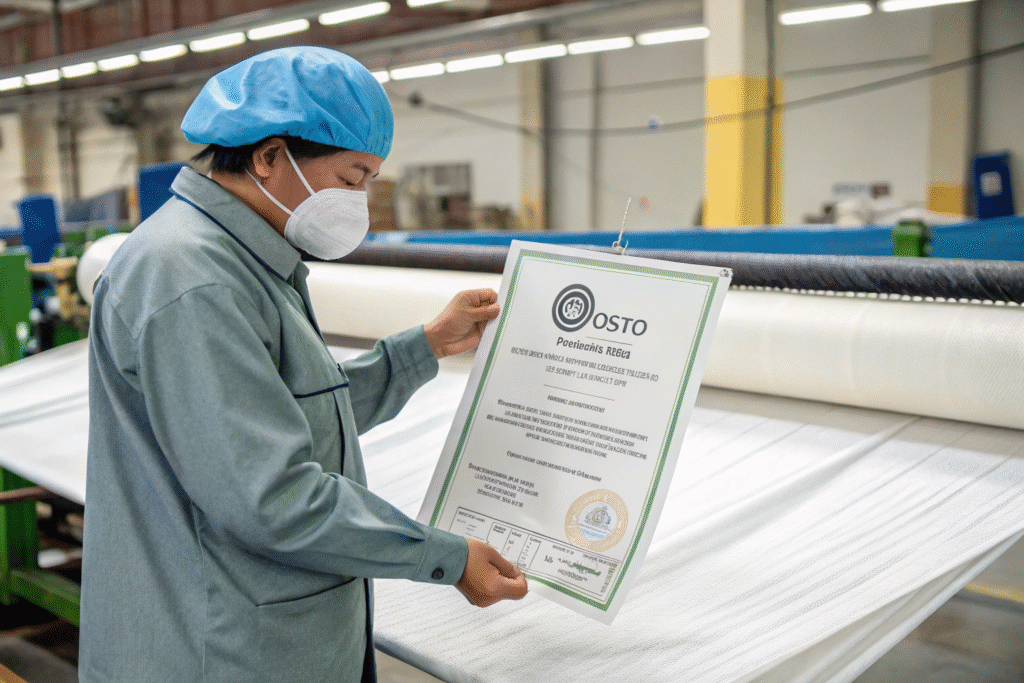
What Certifications Should Quality BAMSILK Suppliers Possess?
Reputable BAMSILK suppliers should maintain relevant certifications verifying quality, safety, and sustainability. Oeko-Tex Standard 100 certification remains essential, confirming the fabric has been tested against numerous regulated and non-regulated harmful substances. For environmental claims, suppliers should provide evidence of closed-loop production implementation, while Forest Stewardship Council (FSC) certification for bamboo pulp verifies responsible forest management.
Additional valuable certifications include:
- ISO 9001: Indicating robust quality management systems
- ISO 14001: Demonstrating environmental management commitment
- GOTS (Global Organic Textile Standard): Showing understanding of high environmental and social standards
Trustworthy suppliers maintain transparency regarding certifications and willingly provide documentation. Our company maintains these certifications and makes them readily available to establish trust and confidence with manufacturing partners.
How Can Consistent Quality and Timely Delivery Be Ensured?
Maintaining consistent quality and reliable delivery requires suppliers with established infrastructure and processes. Our company's in-house CNAS-accredited testing center ensures every BAMSILK batch meets international standards for composition, colorfastness, shrinkage, and durability. This comprehensive testing regimen guarantees consistent fabric quality across multiple production runs and orders.
Logistical capability is equally crucial for timely delivery. Our strategic location within Keqiao's comprehensive textile ecosystem provides access to multimodal transportation networks and established relationships with shipping providers, securing capacity even during peak seasons. Our quality control teams monitor production milestones to prevent delays, while QR code tracking systems provide real-time order visibility from manufacturing through delivery, enabling effective inventory planning and product launch management.
Conclusion
Fabric selection critically impacts product aesthetics, functionality, and commercial success. BAMSILK bamboo fabric emerges as a premium alternative to traditional viscose, combining exceptional comfort and performance with genuinely sustainable manufacturing. Its closed-loop production, natural antibacterial properties, and effective moisture management make it an ideal selection for contemporary apparel brands seeking to balance quality with environmental responsibility.
For brands developing clothing collections that integrate comfort, sustainability, and market appeal, BAMSILK represents an optimal fabric solution. At Fumao Textiles, we provide comprehensive partnership from initial sampling through final delivery, ensuring quality and reliability throughout the manufacturing process. To explore how BAMSILK can enhance your product offerings, please contact our Business Director, Elaine, at elaine@fumaoclothing.com. We look forward to collaborating to transform your creative vision into reality.
